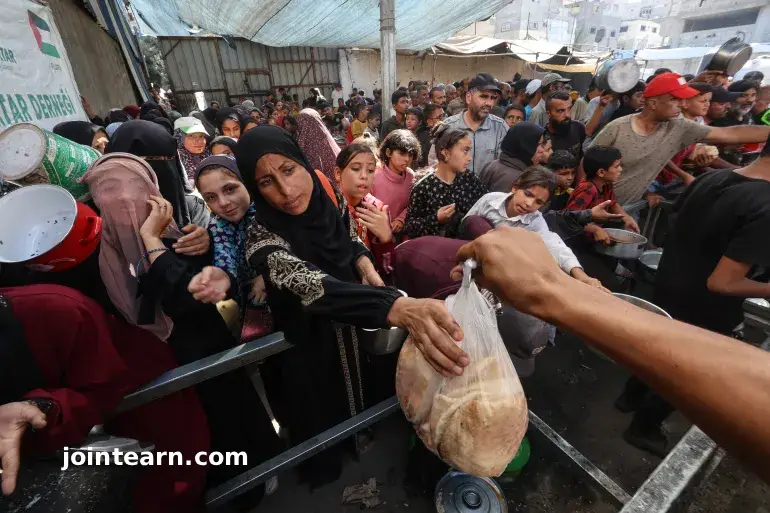
Gaza City – As the world marks World Food Day, more than two million Palestinians in Gaza are facing severe hunger and thirst amid ongoing Israeli restrictions on humanitarian aid. Despite a ceasefire agreement that was expected to ease suffering, aid agencies say Israel continues to limit food and medical deliveries, pushing Gaza deeper into a humanitarian catastrophe.
Israel Cuts Aid Convoys Despite Ceasefire
Under the current ceasefire agreement, Israel was to permit 600 humanitarian aid trucks per day to enter the Gaza Strip. However, according to aid monitors, the number has been reduced to just 300 trucks daily, with Israeli officials citing “operational delays” related to the recovery of captive bodies buried under rubble.
The UN2720 Monitoring and Tracking Dashboard, which oversees aid deliveries, reports that between October 10 and 16, only 216 trucks successfully reached their destinations inside Gaza.
Satellite imagery from Planet Labs taken on October 14 and 15 revealed long lines of aid trucks stalled at the Rafah crossing on the Egyptian side and near Kerem Abu Salem, waiting for Israeli clearance.
Food Aid Scarce, Medical Supplies Depleted
Inside Gaza, residents are struggling to survive. According to Al Jazeera’s Hind Khoudary, who reported from Deir el-Balah, a few commercial trucks have entered the Strip in recent days, carrying essentials such as wheat, rice, sugar, oil, fuel, and cooking gas. But the majority of Palestinians, impoverished after two years of war and displacement, cannot afford to buy even basic food items.
“Palestinians want food, they want shelter, they want medicine,” Khoudary said, describing the desperation among families waiting for food parcels.
Humanitarian workers warn that even if 600 trucks were entering daily, it would still be insufficient to meet the needs of Gaza’s 2.3 million residents, many of whom have been displaced multiple times.
UN Demands Israel Open More Crossings
The UN’s humanitarian chief, Tom Fletcher, has called on Israel to open additional border crossings and stop using food as a “bargaining chip.”
“We need more crossings open and a genuine, practical approach to removing obstacles,” Fletcher said. “Withholding aid from civilians is not a bargaining chip – it is a violation of international law.”
Since the ceasefire began, the World Food Programme (WFP) has managed to deliver 137 trucks loaded with flour and essential food items, supporting bakeries and nutrition programs. But aid workers say deliveries are still a fraction of what’s needed to prevent mass starvation.
UNRWA Still Blocked from Delivering Aid
The United Nations Relief and Works Agency (UNRWA), which plays a crucial role in Gaza’s humanitarian response, continues to face restrictions imposed by Israel.
UNRWA officials say they have enough aid stored in Jordan and Egypt to sustain Gaza’s population for three months — including food parcels for 1.1 million people, flour for 2.1 million, and shelter supplies for 1.3 million. Yet, despite repeated requests, Israeli authorities have blocked UNRWA convoys from entering Gaza.
The agency has warned that continued obstruction could worsen the famine-like conditions already taking hold across northern and central Gaza.
Rising Death Toll from Starvation
According to UN data, at least 463 Palestinians, including 157 children, have already died from starvation since the beginning of Israel’s blockade. Nearly one in four children in Gaza now suffers from severe acute malnutrition, a condition that requires immediate medical care.
Doctors warn that when food becomes available, it must be carefully reintroduced to avoid re-feeding syndrome — a potentially fatal reaction that occurs when malnourished bodies suddenly receive nutrients after prolonged deprivation.
Children and Mothers at Greatest Risk
The United Nations Office for the Coordination of Humanitarian Affairs (OCHA) reports that 90% of children under two in Gaza eat fewer than two food groups per day, lacking essential proteins and vitamins.
Currently, 290,000 children aged six months to five years, and 150,000 pregnant or breastfeeding women, require urgent nutritional aid. If restrictions continue, projections show that by June 2026, 132,000 children under five and 55,000 mothers could suffer acute malnutrition or worse.
“Food Is Not a Weapon”
Aid agencies stress that access to food is a basic human right, not a political tool. On this World Food Day, humanitarian leaders are urging the international community to pressure Israel to lift its restrictions and allow full-scale aid operations.
“Food must never be used as leverage in political or military negotiations,” said a UN spokesperson. “The people of Gaza need bread, not bureaucracy.”
As global attention turns toward hunger and food security, Gaza’s situation stands as a stark reminder of how war and politics can starve entire populations, even in an age of abundance.


Leave a Reply